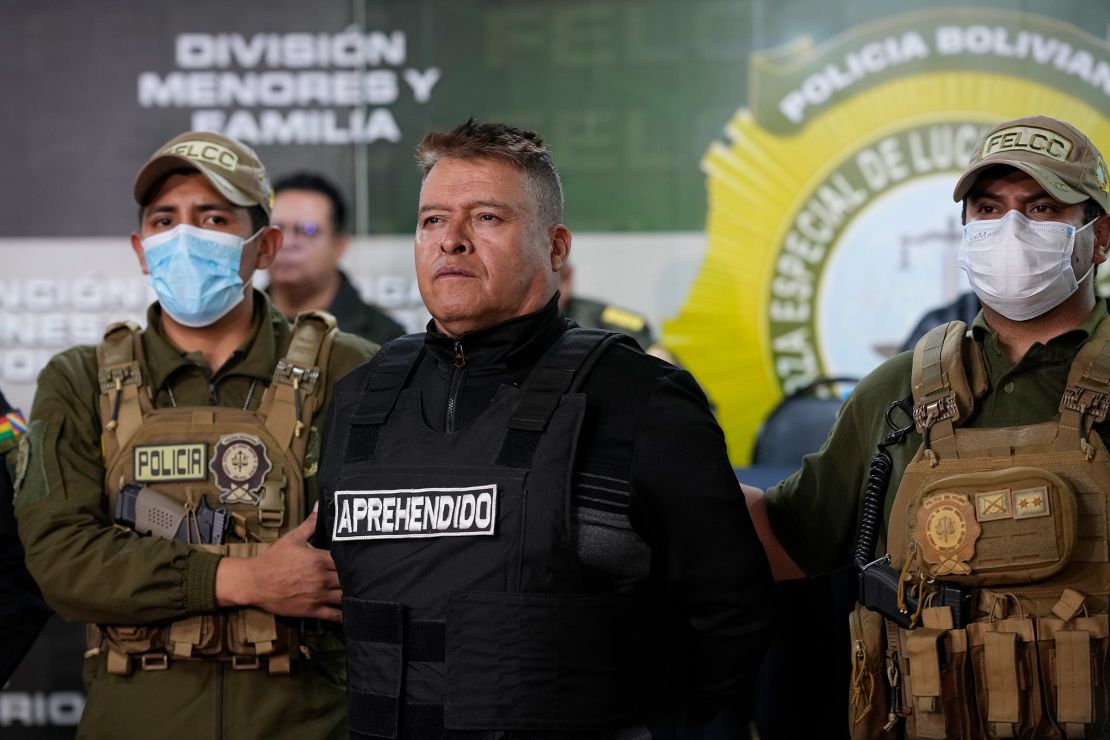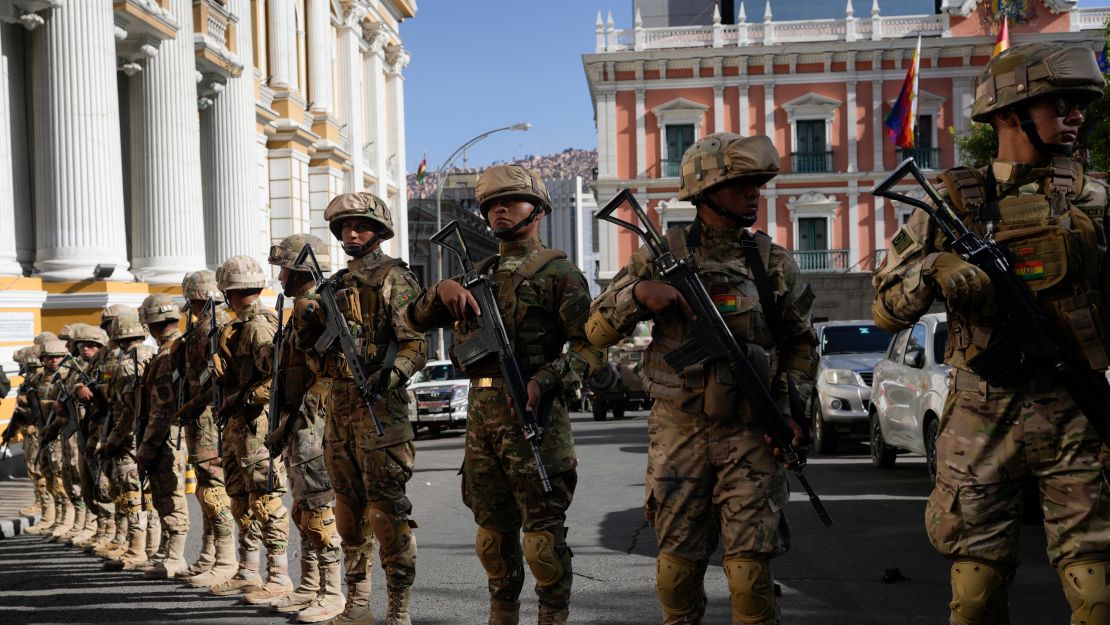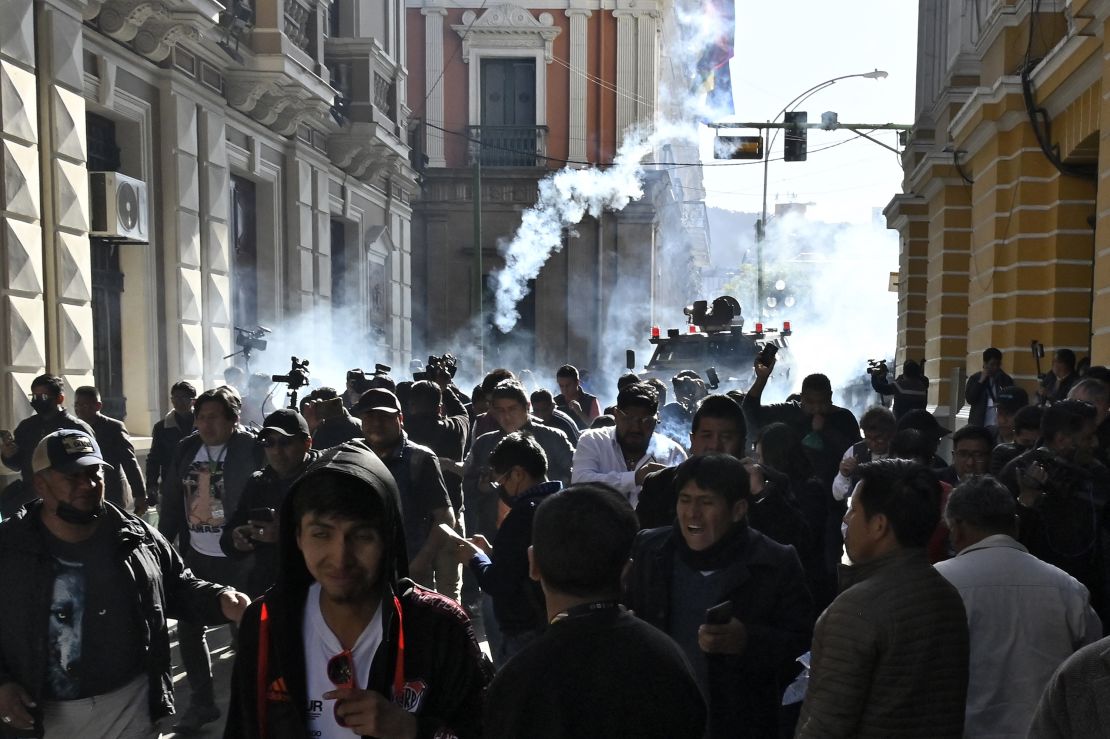A Bolivian general has been arrested and accused of mounting a coup against the government after attempting to storm the presidential palace on Wednesday.
Military units led by Gen. Juan Jose Zú?iga – dismissed as commander of the Bolivian army just a day earlier – occupied the main square in the capital, La Paz, as armored vehicles rammed the palace door and soldiers tried to break into government offices.
Hours later, President Luis Arce – who had called on the public to “organize and mobilize” in defense of democracy – could be seen confronting Zú?iga in the crowded palace hallway, ordering the general to withdraw his soldiers and stand down.
After Zú?iga was handcuffed and forced into a police car, a triumphant Arce raised his clenched fist to the huge crowds that had flocked to the presidential palace, signaling the defeat of the attempted coup.
His defense minister Edmundo Novillo later told a news conference the government had regained “total and absolute control” over its military. “We urge the population that everything goes back to normal,” he said.
Bolivia has a long history of political instability - there have been almost 40 attempted or successful coups since 1946. The failed takeover comes as the landlocked South American country of some 12 million people struggles with a spiraling economic crisis that has sparked street protests in recent months.
The country has been wracked by dwindling foreign currency reserves, particularly the US dollar, and shortages of fuel and other basic necessities.
As he was being arrested Zú?iga alleged – without providing evidence – that he was acting on Arce’s instructions.
“On Sunday I met with the president and the president told me, ‘The situation was very f*****, that this week would be critical. And so, it’s necessary to prepare something to bring up my popularity.’ And so he told me, he asked me, ‘Shall we take out the armored (vehicles)?’” Zú?iga told reporters.
Justice Minister Ivan Lima denied Zú?iga’s claims, saying he “lies and tries to justify himself about a decision he took and over which he will have to answer to justice.”

The attempted coup was widely condemned by the Bolivian government and international leaders.
Bolivia’s Attorney General’s Office said it has launched a criminal investigation against Zú?iga and “all the other participants” involved in the incident. It is unclear where Zú?iga is being held.
‘The people have no future’
Earlier Wednesday, footage from the scene showed armed soldiers occupying Murillo Plaza, a main square in La Paz where the national executive and legislative offices are located.
Armored vehicles were seen ramming into the doors of Bolivia’s government palace, according to the Associated Press, as former president Morales, who is a member of Arce’s Movement to Socialism (MAS) party, said on X that a “coup d’état is brewing.”
Video also showed some civilians facing off with soldiers in Murillo Plaza during the coup attempt.
Bolivia’s latest political showdown comes as tensions rise over plans by leftist former president Evo Morales to run for reelection against one-time ally Arce in general elections next year.

Prior to his detention, Zú?iga addressed reporters in the square, flanked by soldiers, saying, “We want to restore democracy,” as he spoke of the country’s economic woes. He had earlier been dismissed reportedly for threatening to block a bid by Morales for reelection.
“The people have no future, and the army has the courage to look out for the future of our children, the well-being and progress of our people,” he said.
He vowed “to free all political prisoners” including former president Jeanine Anez,?currently imprisoned for what the courts said was her role in deadly protests that erupted after her ascension to power in 2019.
Amid the chaos, President Arce announced new military commanders, including Zú?iga’s replacement as army chief, Gen. José Sánchez.
The situation appeared to have been defused when Sánchez ordered the soldiers in the square?to return to their units.
Armed vehicles were seen leaving Murillo Plaza soon after, according to footage from Bolivia TV. Arce also announced new heads of the navy and the air force.
CNN is trying to contact Bolivia’s government for comment.
Morales, who publicly split from his former ally Arce, resigned as president in 2019 following mounting protests over accusations of election fraud; at the time, he claimed he was forced out in a coup.
Gustavo A. Flores-Macías, professor of government and public policy at Cornell University, told CNN the attempted coup reflects widespread discontentment in the country.
“What is happening in Bolivia is that broad sectors of society, across social strata, across all levels, are very unhappy with the way things are, especially on the economic front. And, we have an election coming in 2025,” he said.
In that election, Arce and Morales “seemed to be in this collision course. Both of them angling to become the next president,” he added.

International condemnation
Fredy Mamani, former deputy foreign minister of Bolivia and an ally of Morales and Arce, told CNN that despite the “undemocratic” nature of “the tanks, the uniformed soldiers and taking the square… it is essential to highlight that the Bolivian people are united in the face of any coup d’etat.”
But echoing Zú?iga’s comments, an opposition MP accused the government of staging the coup in a bid to rally support.
“What happened today in Bolivia is a really bizarre situation,” Andrea Barrientos, a Senator for the opposition Civic Community party, told the BBC. “We can confirm that this was a self-coup, organized by Luis Arce’s government.”
News of the attempted coup was roundly condemned by international and regional leaders, including Paraguay’s President Santiago Pe?a, Mexico’s president, and the European Union.

“We express our support for democracy in our brother country and to the legitimate government of Luis Arce,” Chile’s President Gabriel Boric said on X.
The US Embassy in La Plaz said it was “closely monitoring the situation.”
The secretary general of the pan-American Organization?of?American?States (OAS), Luis Almagro, condemned the mobilizations in the “most energetic way,” on X, saying the “army must submit to the legitimately elected civil power.”
Bolivia has struggled with both persistent political crises and ongoing interference from the army, Carlos Solar, Senior Research Fellow at RUSI, told CNN.
This added to a “high degree of polarization by politicians who have not been able to carry out electoral successions” have undermined Bolivia’s democratic governance.
This story has been updated with additional developments.


